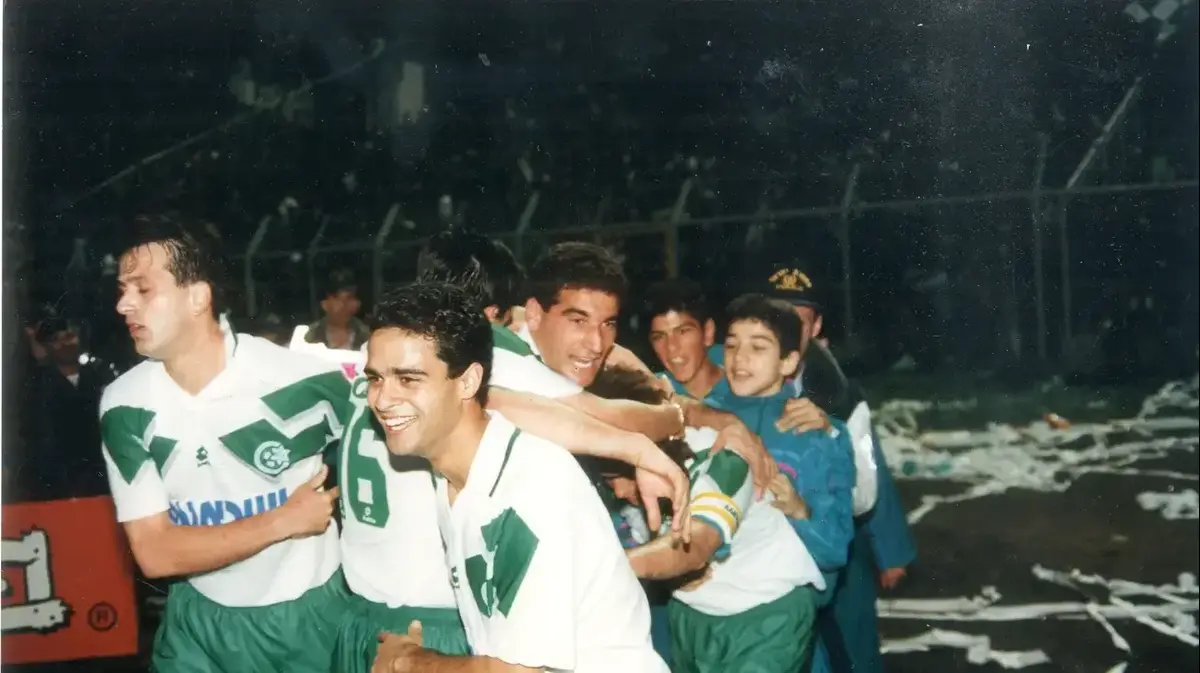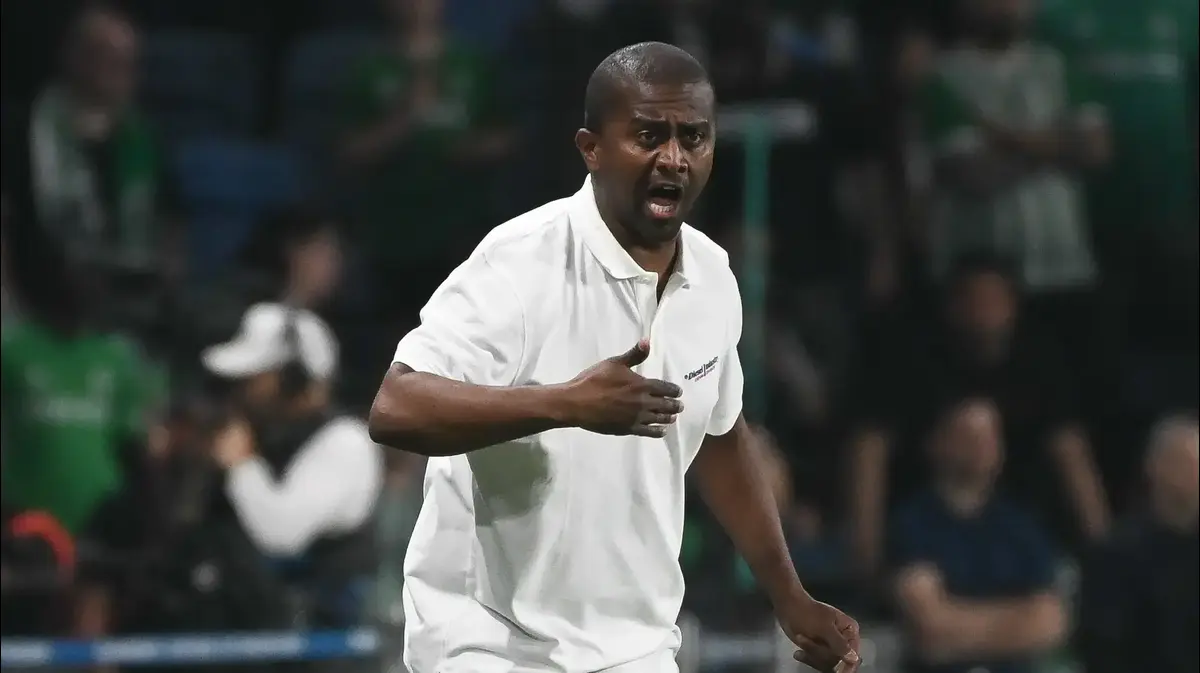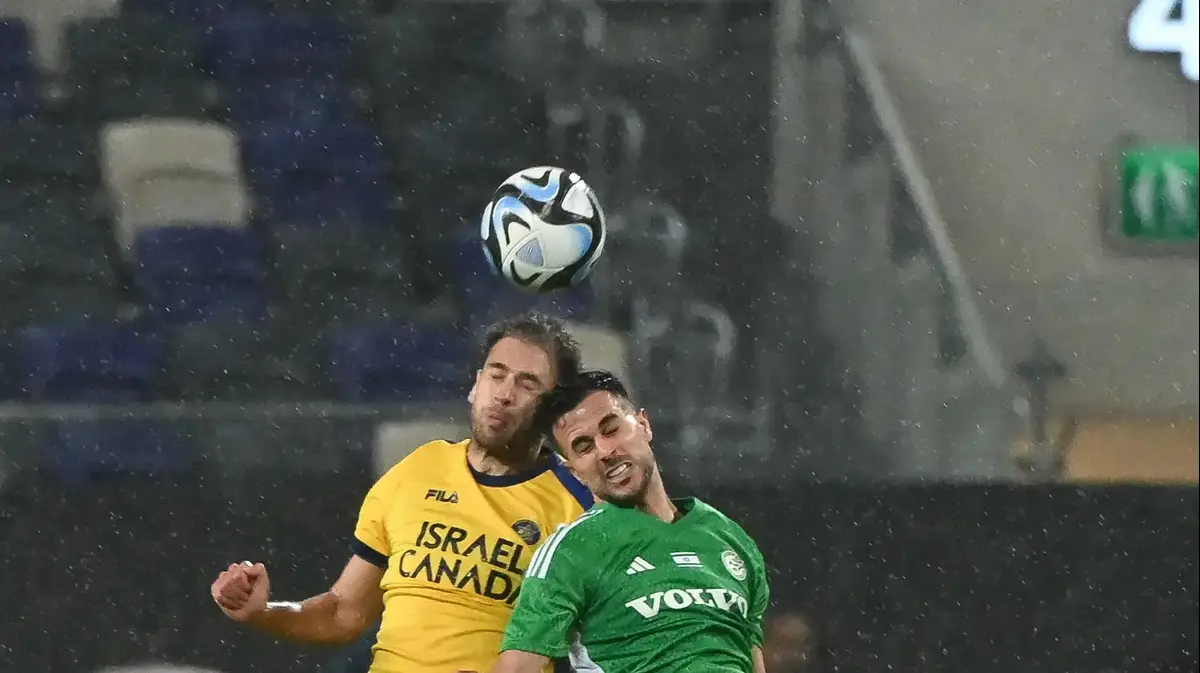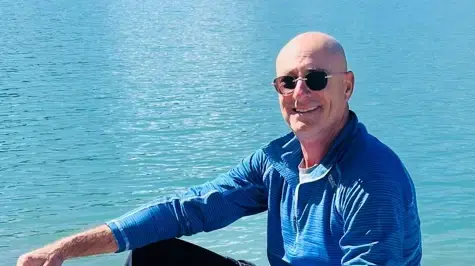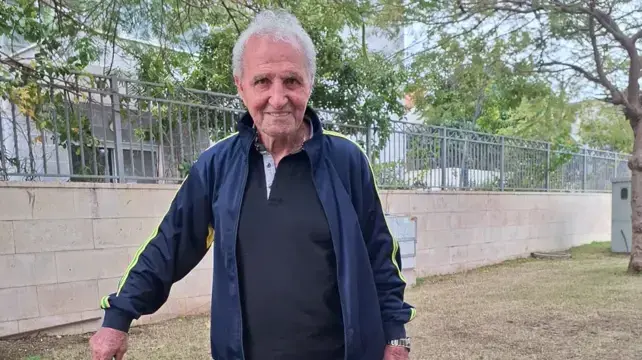In 1996, after two seasons in Barcelona's first team and without his father on the Camp Nou bench, Jordi Cruyff signed for United.
Sir Alex Ferguson had come looking for him in the Catalan capital.
"We will protect you," he promised her.
So, the son of the Barcelona legend began a trip around the world (England, Ukraine, Malta, Cyprus, Israel and China) that ended in 2021 when, led by Joan Laporta and with the complicity of Xavi, he took charge of the Barça sports management.
Along the way, he meets United again in the round of 32 of the Europa League (this Thursday, the first leg at 6:45 p.m., at the Camp Nou).
“When the ball came out I thought: 'Wow!
What a difficult match.
But, on the other hand, a natural smile came out of me.
It is a place that means things to me”, he says.
Sitting in the box of the Camp Nou,
Ask.
When was the last time he was in Manchester?
Answer
.
A couple of months ago.
Manchester is very much alive, there is a lot of foreigners.
When I arrived in '96, the center was closed due to an IRA attack.
And the club did not want the players to be in the center.
So, almost all of us lived in the south.
It shocked me.
I am an urbanite.
I felt strange, to have a coffee you had to take the car.
Q.
And at Old Trafford?
R.
I have not returned since I left.
People don't realize how big United are until they're not there.
I had the idea that the Spanish league was the best in the world and when I got there I saw how they generated more interest.
The number of people waiting for us at the hotel exit was crazy.
Q.
You met a historic generation (David Beckham, Ryan Giggs, Paul Scholes, the Neville brothers and Nicky Butt).
R.
Yes, at that time still young, more of a legend like Cantona.
Q.
What is Cantona like?
R.
For outsiders, introvert.
He gave people respect.
But then… I remember that he would pick up the three or four young boys from the hotel to take us to training.
You don't expect such a thing from Cantona.
Q.
You had Cantona as your driver.
R.
More than a driver, a social partner.
He was interested in us, in making our lives a little more comfortable.
I think I was the first to find out that he was going to retire.
There had been a game here in Barcelona and on the return trip to Manchester we made a bet as to which of us would leave before United.
At the end of the season, he retired.
It was a
shock
to everyone.
Q.
Your first two coaches were your father and Ferguson.
From there everything goes down?
R.
No, you learn something from everyone.
But there are things that at the age of 20 did not seem logical to me and today I realize that they saw them before anyone else.
Ferguson, for example, would plan games two to three weeks in advance.
He believed that a player was going to be important at one time and another footballer at another.
He would come and tell you: “You are not going to play these two games, but the third one will.
Get ready."
And I answered him: “And if the one who plays in my place scores two
hat-tricks
?”.
He laughed and told me: "That will be my problem."
You had to train well, but he was looking for different weapons for different battles.
Q.
Were Ferguson and his father alike in any way?
R.
Ferguson was a manager and my father was a coach.
Alex took care of everything and my father took care of some things that were very important to him, like a proper salary scale.
My father was essentially a turf coach.
He would take the ball and tell you: "I want you to do this and this."
He did it and you thought: “If a 50-year-old person does it, we can do it too”.
And we couldn't always.
But, to the point, Ferguson didn't catch the ball and teach you something.
Q.
How do you view the game this Thursday?
R.
When the draw was made it seemed that the two clubs were in a very difficult moment.
Now it seems that we should have met at another stage.
Q.
Do you have any explanation of United's journey after Ferguson's departure?
A.
The Ferguson vacuum may be one explanation.
Another may also be the arrival of an owner from outside.
Who makes the decision of which coach has to come?
A good manager does not mean that he is a good manager at all clubs.
Perhaps the club has a squad that is not adapted to what that coach can offer.
But to understand this formula, you have to understand how the soccer kitchen works.
Q.
Erik ten Hag found that formula?
R.
The fact that he has taken people from his previous team surely means that he wanted to be with players who understand him quickly and better, but that does not necessarily mean that they understand the English league.
No one can argue that United have always had talented squads.
The issue is that they had to make a team.
And that's not the same.
Q.
Is that what Xavi has achieved?
Make a team?
R.
In the Champions League games we concede many goals.
And, when that happens, it is very difficult to win.
You don't put four into a Champions League team.
Now, both areas are very strong.
The team scores goals, but, above all, it doesn't fit.
P.
Where are the midfielders in all this?
Weren't they the Barça DNA?
A.
Here there are three lines, with two of the three you don't win a game.
You need balance.
What happened is that 15 years ago if your team had 70% possession, the most normal thing was that they would win.
Nowadays, whatever you want to do, do it fast.
If we're going to do four touches, do it fast.
If after a steal you make a forward pass, which does not mean a counterattack, also do it quickly.
That makes a lot of difference.
Maybe in five years there are other rules.
Soccer is changeable.
If you want to win, you have to adapt.
When talking about the two areas, it does not mean that those in the middle are not important, simply that they are more demanding.
Q.
Does President Laporta have an opinion on the transfers?
R.
Let work.
There are the three of us Mateu [Alemany, director of football], Xavi and I, who make the decisions for better and for worse.
Q.
How do you analyze the markets they have made?
R.
In the market of December last year we were, I don't know if sixth or seventh in the table, and we went looking for the English league because it is the league in which there is the most movement.
And in which he assured us players of immediate performance.
And, in the summer market, people say that we have spent a fortune.
But it is that three weeks later the prices doubled.
United paid 105 million for a winger like Antony.
And centrals were paid for 80 million, when we had signed Koundé for 50.
Q.
Did you anticipate that the market was going to be inflationary?
R.
No, but it was a good market.
Dynamic, fast and experienced players were brought in.
Q.
You repeat a lot about dynamic and fast.
R.
Today you can't play any other way.
Q.
What would your father say about that?
R.
To my father?
He loved fast soccer.
He preferred to play one touch than five.
My father didn't always play 4-3-3.
He often used the 3-4-3 with a rhombus in the center of the field.
He was multisystem.
When the rival played with only one striker, he used two defenders.
If they played him with two forwards, he would put three center-backs.
And if the opponent had three up, he placed four back.
He wasn't worried about the system, he was worried about the spaces.
Jordi Cruyff. Gianluca Battista
Q.
So why are people obsessed with systems?
A.
I don't know.
Barça will continue with its DNA and will try to play in the same way as always.
Master the game.
Occupy spaces, especially those outside.
press up
It's not changing anything.
What has changed is that in soccer the players do not stop moving.
Then what do you do?
Have speed to generate a cheerful and attacking football.
And Barça is doing it.
Q.
What did the World Cup leave you with?
R.
It was a team world cup.
They lacked players of pure talent.
Or there was less than before.
Q.
And Messi?
R.
The gods said that he could not leave without winning a World Cup.
And she deserved it.
Q.
Deserve?
His father didn't have it and surely he deserved it too.
R.
But 74 changed part of football.
And my father was happier for it.
It was more about legacy than titles.
I made a lot of trouble with this and he never changed his speech.
Q.
If you have to watch a soccer team?
R.
I watch football matches only for work.
Q.
What did you learn outside of Spain?
R.
In other countries there is not the football culture that there is in Spain.
And you find yourself all day solving things you don't expect.
So when you get here, you don't panic.
That's why I don't like excessive euphoria or great disappointments.
The athlete does not have to think like that or read these things.
Q.
Is it convenient to isolate yourself from everything?
R.
Not being in a bubble, but protecting yourself.
It is not letting non-professional people influence professional people.
You can follow EL PAÍS Deportes on
and
, or sign up here to receive
our weekly newsletter
.
Subscribe to continue reading
Read without limits
Keep reading
I'm already a subscriber

/cloudfront-eu-central-1.images.arcpublishing.com/prisa/473UTZ33BNBMTBYBZSUNFM56GY.jpg)
